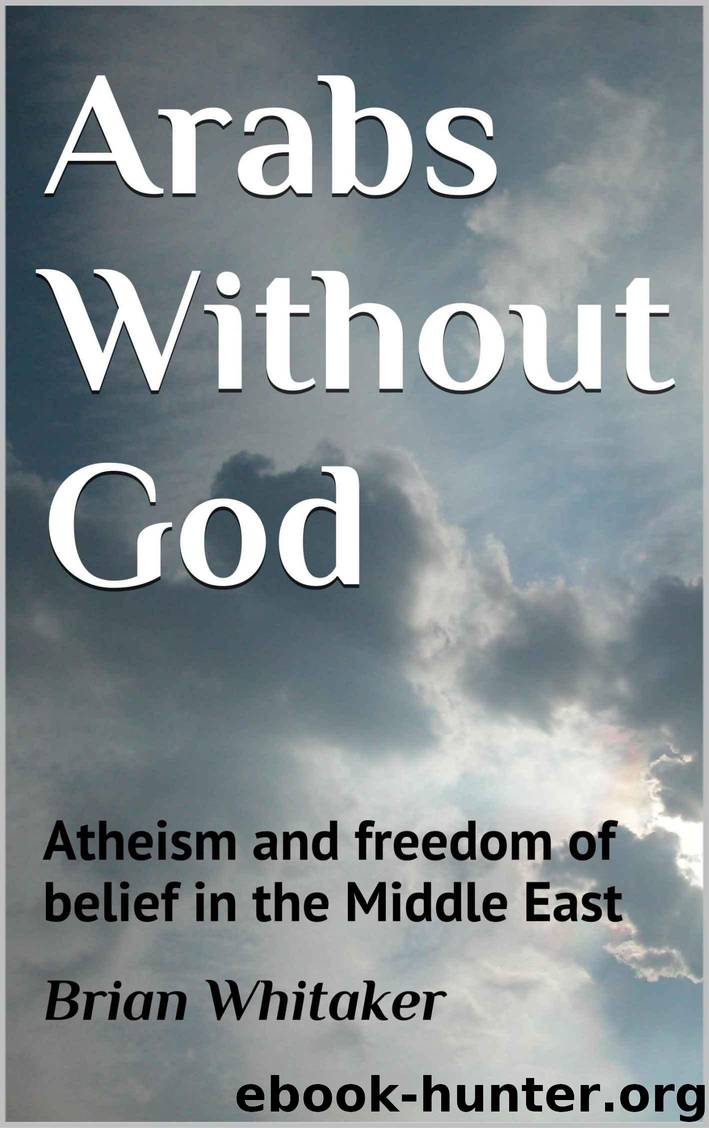Arabs Without God: Atheism and freedom of belief in the Middle East by Whitaker Brian

Author:Whitaker, Brian [Whitaker, Brian]
Language: eng
Format: azw
Published: 2014-09-11T16:00:00+00:00
PART TWO: Protecting religion
6: The privileges of religion
DURING the holy month of Ramadan, adult Muslims fast from sunrise to sunset. Fasting is supposed to encourage self-control but fasting under the threat of arrest is more about obedience than self-control. Using the law to ensure that people fast (as numerous Arab countries do) undermines the moral purpose of Ramadan, just for the sake of keeping up appearances.
Gulf states tend to be the most strict in enforcing Ramadan. The typical penalty is a one-month jail sentence and/or a fine, and the law applies to everyone regardless of religion – on the grounds that seeing someone break their fast is offensive to Muslims even if the fast-breaker is not actually Muslim. In Kuwait, where most of the population are foreigners and non-Muslims account for more than 20% of the total,[184] restaurants and cafes must remain closed during daylight hours, though supermarkets can open. In Dubai, members of the public are officially encouraged to look out for anyone eating, drinking or smoking – even in the relative privacy of their own car – and report them to the police. According to Dubai police, 27 people were arrested for fast-breaking between 2005 and 2009, including a European non-Muslim.
In Egypt, which has a large Christian minority and no law requiring people to fast, the authorities nevertheless embarked on a crackdown in 2009, reportedly arresting more than 150 people in Aswan province and ordering the closure of cafes and restaurants in the Red Sea tourist resort of Hurghada. In the Delta area, seven youths were arrested for smoking in the street (smoking is considered to be fast-breaking) and fined LE 500 ($90) each. The wave of arrests seemed to be mainly the work of some especially religious-minded police officers but the authorities supported them on the grounds that public fast-breaking is a form of “incivility” covered by the Egyptian penal code. Clerics also backed the punishment of those who broke the fast in public. Sheikh Abdel Moati Bayoumi, a member of al-Azhar’s Islamic Research Centre, said: “People are free not to fast, but privately; doing so in public is not a matter of personal freedom … it reveals contempt for those who are fasting, for Ramadan and for the fasting as an obligatory religious duty.”[185]
Arrests for Ramadan infringements are a regular occurrence in Algeria, too, though there has also been public debate about whether fasting should be a matter for the law or personal conscience. Six residents in the town of Biskra were arrested for eating and playing cards during the daylight hours of Ramadan in 2008. They were each fined 120,000 dinars ($1,770) though an appeals court judge later quashed the sentences, saying they violated constitutional provisions for freedom of belief. In a separate case, three men convicted of smoking during Ramadan in Algeria had their three-year jail sentences reduced to two months on appeal. In 2011, a group of men working on a construction site were imprisoned for eating during Ramadan even though they insisted they were not Muslims.
Download
This site does not store any files on its server. We only index and link to content provided by other sites. Please contact the content providers to delete copyright contents if any and email us, we'll remove relevant links or contents immediately.
From Bacteria to Bach and Back by Daniel C. Dennett(2481)
The God delusion by Richard Dawkins(2305)
Boy Erased by Garrard Conley(1727)
THE SELFISH GENE by Richard Dawkins(1620)
The Falls by Unknown(1520)
God Is Not Great by Christopher Hitchens(1326)
Christopher Hitchens by The Portable Atheist: Essential Readings for the Nonbeliever(1317)
Outgrowing God by Dawkins Richard(1314)
the god delusion by richard dawkins(1313)
THE GOD DELUSION by Richard Dawkins(1308)
Drunk with Blood: God's Killings in the Bible by Steve Wells(1280)
Triumvirate of Rationalism: Thomas Paine, Thomas Jefferson, and George Orwell by Christopher Hitchens(1278)
The Rage Against God by Peter Hitchens(1262)
About the Holy Bible by Robert G. Ingersoll(1260)
The Atheist Muslim by Ali A. Rizvi(1226)
Atheism: A Very Short Introduction by Julian Baggini(1215)
Why I Am Not a Christian and Other Essays by Bertrand Russell(1180)
Battling the Gods by Tim Whitmarsh(1150)
Emancipation of a Black Atheist by D. K. Evans(1147)
